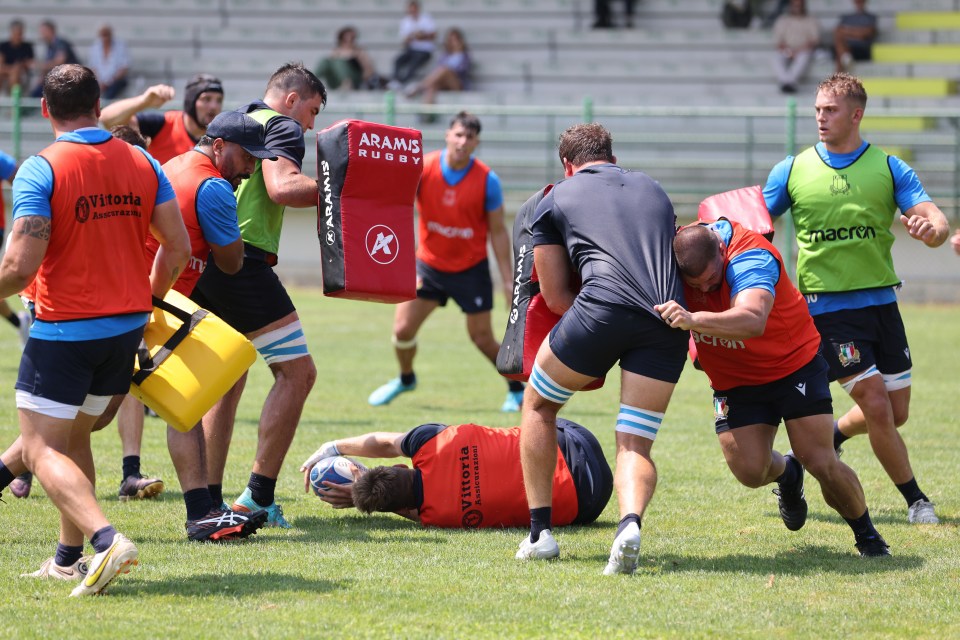‘Made in Britain tag huge for India founded rugby equipment business’

The Rugby World Cup is drawing to a close in France and England are shaping up for their bronze medal match nicely after losing to South Africa last weekend. But at their camp in the northwest coastal commune of Le Touquet – alongside major brands supplying kit, drinks and partnerships – is training equipment by little known firm Aramis.
An Indian founded brand famed for little more than breaking the world record for the largest ever authentically made rugby ball, Aramis is taking the rugby scene by storm, all from their home base in South Molton in Devon.
Their scrum machines have satellite programming, allowing an England team in France to push in real time against an opposition outfit at the side’s UK base at Pennyhill Park. Their technology is customisable and will soon filter down to grassroots, earning it the winning Rugby World Cup contract – albeit slightly controversially – from major sector rival Rhino, who unsuccessfully threatened legal action over the call.
Aramis centenary
But long after the World Cup and in the years leading up 2027 – when the brand’s parent company turns 100 years old – Aramis Rugby’s UK arm are looking to build upon their British foundations and expand their operations on these shores, largely down to the kudos that comes with products which are branded as “Made in Britain”.
“A classic example is scrum machines at the Australians,” Aramis chief executive Vikas Mahajan tells City A.M. “They would rather buy a scrum machine here and ship it from England all the way to Australia than buy a scrum machine made in India even though it would be half of the way to them already.
“We try to manufacture here, send it to India, do the labour intensive work and when it comes back do the finishing here.
“People initially think, ‘Oh, manufacturing is not possible over here, you cannot compete with the Far East’ but we have proven that it is possible.
“We are bringing all our manufacturing in house because we feel that for additional extra cost, we can get people in over here, provide local employment here, produce something here where extra costs can be offset by the extra premium we can charge on something which is made in Britain.
Made in Britain
“We have our own 100 per cent owned companies still in India – where we employ over 150 people, 63 per cent of which are women – but anything that’s more technologically advanced we do here because it gives us the additional kudos of being made in Britain.
“We are slowly bringing [more] things over here. The next step is to bring in all the training equipment and tackle bags over here. We’ve already done about 10 per cent, but hopefully in the next six to seven years, our goal is to bring 100 per cent of that also into North Devon.”
Aramis’ roots are 20 years deep in the United Kingdom, and their mantra has been to cut out the middleman. Why spend £100 on something from a major player when you can go straight to the manufacturer for a fraction of the cost?
The pinnacle of what Aramis are providing to the Rugby World Cup would see a scrum machine valued at £25,000, but clubs across England will have access to products at a lower price point – Millwall Rugby Club probably doesn’t need satellite connectivity.
But it wasn’t always the plan to a mass manufacturer of sports gear, sales director Roshni Mahajan adds.
“Necessity is the mother of invention,” she says. “We had contracts in the rugby industry, because we were supplying to grassroots clubs and they realised that it is not important to pay £50 for a shirt, or £25 for a ball. You don’t have to do that.
North Devon rugby hot spot
“So we started supplying to them [at a lower price point] and one thing led to another, then we started supplying to unions.
“Everything starts in a little office in a factory in north Devon.”
Aramis is the culmination of what happens when a family business takes a leap with hopes of a successful outcome. And in South Molton this Indian founded firm, edging on their centenary in the sports business, have settled on a home.
“I’m looking forward to the journey after the World Cup because massive doors are opening up,” Roshni Mahajan says. “I think that is what happens when people see you and they realise that it’s good quality, it’s affordable and you get good service.
“Avenues are opening up for us and we’re going to take each and every opportunity.”